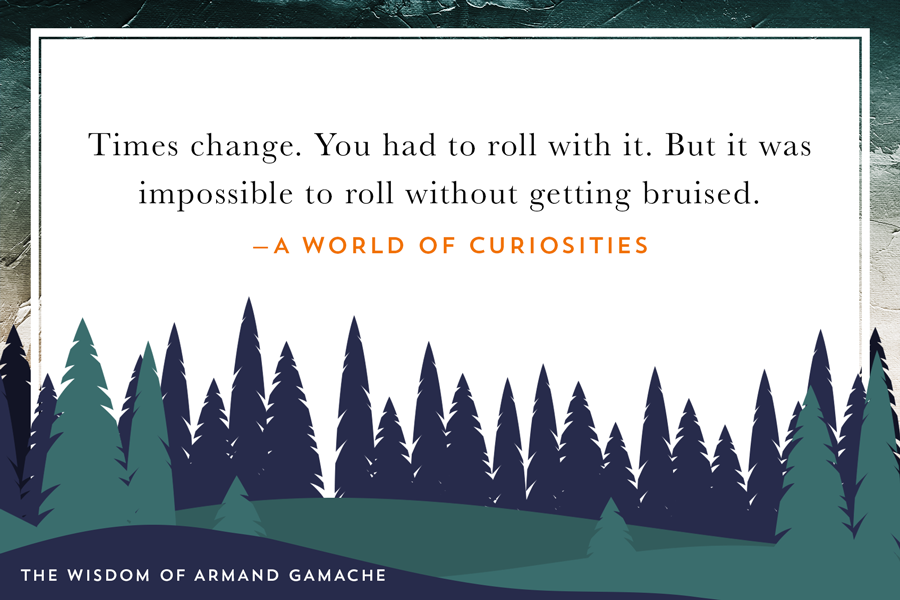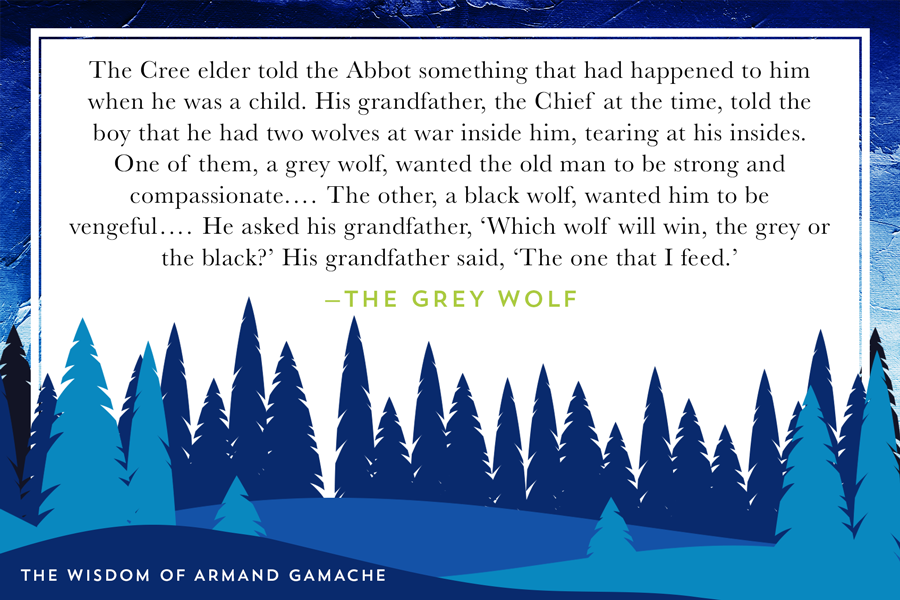At thirty-five years old, Jean Guy Beauvoir had been Gamache’s second in command for more than a decade. He wore cords and a wool sweater under his leather jacket. A scarf was rakishly and apparently randomly whisked around his neck. It was a look of studied nonchalance which suited his toned body but was easily contradicted by the cord-tight tension of his stance. Jean Guy Beauvoir was loosely wrapped but tightly wound. – Still Life
Jean Guy Beauvoir was constantly at war with himself, at odds over his need to wear clothes that showed off his slender, athletic build, and his need not to freeze his tight ass off. It was nearly impossible to be both attractive and warm in a Quebec winter. And Jean Guy Beauvoir sure didn’t want to look like a dork in a parka and stupid hat. – A Fatal Grace
Then the Chief Inspector had found him, taken him onto homicide and a few years later promoted him to inspector and his second in command. But Jean Guy Beauvoir never totally left the cage. Instead it had moved inside and in it he kept the worst of his rage, where it couldn’t cause damage. And beside that cage sat another, quieter cage. In it, curled up in a corner, was something that frightened him far more than his fury. Beauvoir lived in terror that one day the creature in there would escape. – The Cruelest Month
Inspector Jean Guy Beauvoir stepped out of the car and looked at the sky. Unremitting gray. It would rain for a while yet. He looked down at his shoes. Leather. His slacks designer. His shirt. Casual linen. Perfect. Fucking middle of nowhere murder. In the rain. And mud. He slapped his cheek. And bugs. Flattened to his palm were the remains of a mosquito and some blood. Fucking perfect. Agent Isabelle Lacoste opened an umbrella and offered him one. He declined. Bad enough to be here, he didn’t need to look like Mary Poppins. – A Rule Against Murder
Chief Inspector Armand Gamache got the call just as he and Reine-Marie finished clearing up after Sunday brunch. In the dining room of their apartment in Montreal’s Outremont quartier he could hear his second in command, Jean Guy Beauvoir, and his daughter Annie. They weren’t talking. They never talked. They argued. Especially when Jean Guy’s wife, Enid, wasn’t there as a buffer. – The Brutal Telling
Every hour of every day Jean-Guy Beauvoir searched for not just facts, but truth. He hadn’t appreciated, though, how terrifying it was being with someone who spoke it, all the time. – Bury Your Dead
Since his separation from Enid, Jean Guy had seemed distant. Aloof. He’d never been exactly exuberant but Beauvoir was quieter than ever these days, as though his walls had grown and thickened. And his narrow drawbridge had been raised. – A Trick of the Light
Jean-Guy Beauvoir loved his job. But now, for the first time, he looked into the kitchen, and saw Annie standing in the doorway. Watching him. And he realized, with surprise, that he now loved something more. – The Beautiful Mystery
Beauvoir liked lists. Gamache liked thoughts, ideas. Beauvoir liked to question, Gamache liked to listen. And yet there was a bond between the older man and the younger that seemed to reach through time. They held a natural, almost ancient, place in each other’s lives. Made all the more profound when Jean-Guy Beauvoir fell in love with Annie, the Chief’s daughter. – How the Light Gets In
Late into his thirties, with a broken body and a shattered spirit, Jean-Guy Beauvoir had been seduced by happiness. – The Long Way Home
Out on the green, Lacoste’s two children were fighting with Jean-Guy Beauvoir for the ball. The grown man appeared to be sincerely, and increasingly desperately, trying to control the play. Lacoste smiled. Even against kids, Inspector Beauvoir did not like to lose. – The Nature of the Beast
Inspector Jean-Guy Beauvoir knew that his mountain analogy with Gamache had been wrong. If you died on the side of a mountain, it was in the middle of a selfish, meaningless act. A feat of strength and ego, wrapped in bravado. – A Great Reckoning
He’d known Jean-Guy long before he’d become his son-in-law, having hired Agent Beauvoir away from a dead-end job guarding evidence. He’d taken a young man no one else wanted and made him an inspector in homicide, to everyone’s surprise. But it had seemed natural, to Gamache. He barely had to think about it. They were chief and agent. Patron and protégé. They were the head and the heart. Now father-in-law and son-in-law. Father and son. They had been thrown together, joined together, it seemed, for this lifetime, and many past. – Glass Houses
Beauvoir walked briskly to the subway and what he knew would be the final internal-affairs interview before all returned to normal. His head was down, and he concentrated on the sidewalk and the soft, light snow hiding the ice below. One misstep and bad things happened. A turned ankle. A wrist broken trying to break the fall. Or a fractured skull. It was always what you couldn’t see that hurt you. – Kingdom of the Blind
When Jean-Guy Beauvoir had arrived twenty minutes earlier, he’d gone directly to his office and closed the door. It wasn’t something he normally did. Normally his door was wide open. Normally he went straight to the conference room. Normally he was the only Chief Inspector of homicide there. But this was not a normal day. How the next half hour or so went would set the tone going forward. – A Better Man
And then Jean-Guy arrived. Agent Beauvoir. Found in some basement Sûreté servitude. Angry, arrogant. One insult away from being fired from the detachment and booted out of the service. Chief Inspector Gamache had recognized something in the young man. And had, to everyone’s astonishment, not least Agent Beauvoir’s, brought him into homicide. The most sought after, the most prestigious department in the Sûreté du Québec. Armand had become Jean-Guy’s mentor. And more. Jean-Guy had risen to become Armand’s second-in-command. And more. And Daniel had never forgiven either. – All the Devils Are Here
Jean-Guy’s dark hair had some gray now, and a few lines had appeared on his handsome face. His complexion was rosy after a day in the bright sun and gusty wind. Though he’d made it clear he preferred “rugged” to “rosy.” – The Madness of Crowds
While Gamache had become an explorer of human emotions, Jean-Guy Beauvoir was the hunter. They were a perfect, though unequal, team. Watching his father-in-law toss a slimy tennis ball to Henri the German shepherd, Jean-Guy was under no illusions who was the leader. He’d follow him anywhere. And had. – A World of Curiosities
Annie and Jean-Guy lived close to the Gamaches’ pied-à-terre in the Outremont quartier of Montréal. Though the young couple and their two children lived in the less swanky Mile End neighborhood. – The Grey Wolf
Though their relationship has changed and evolved over the years, Jean-Guy Beauvoir is both Armand Gamache’s second-in-command and son-in-law – and the “hunter” to Gamache’s “explorer”. Do you think these excerpts capture Jean-Guy’s character? What else would you add?


